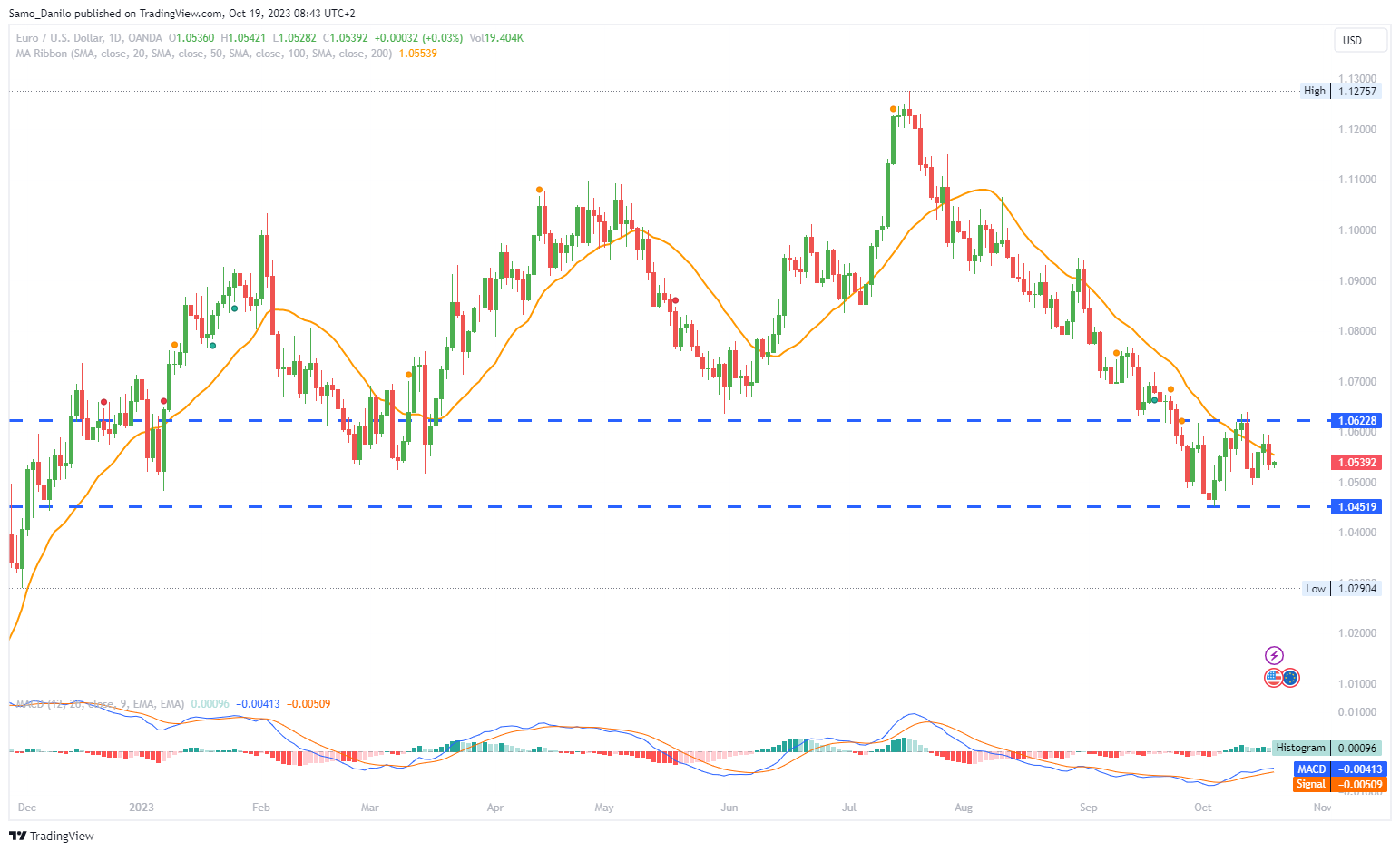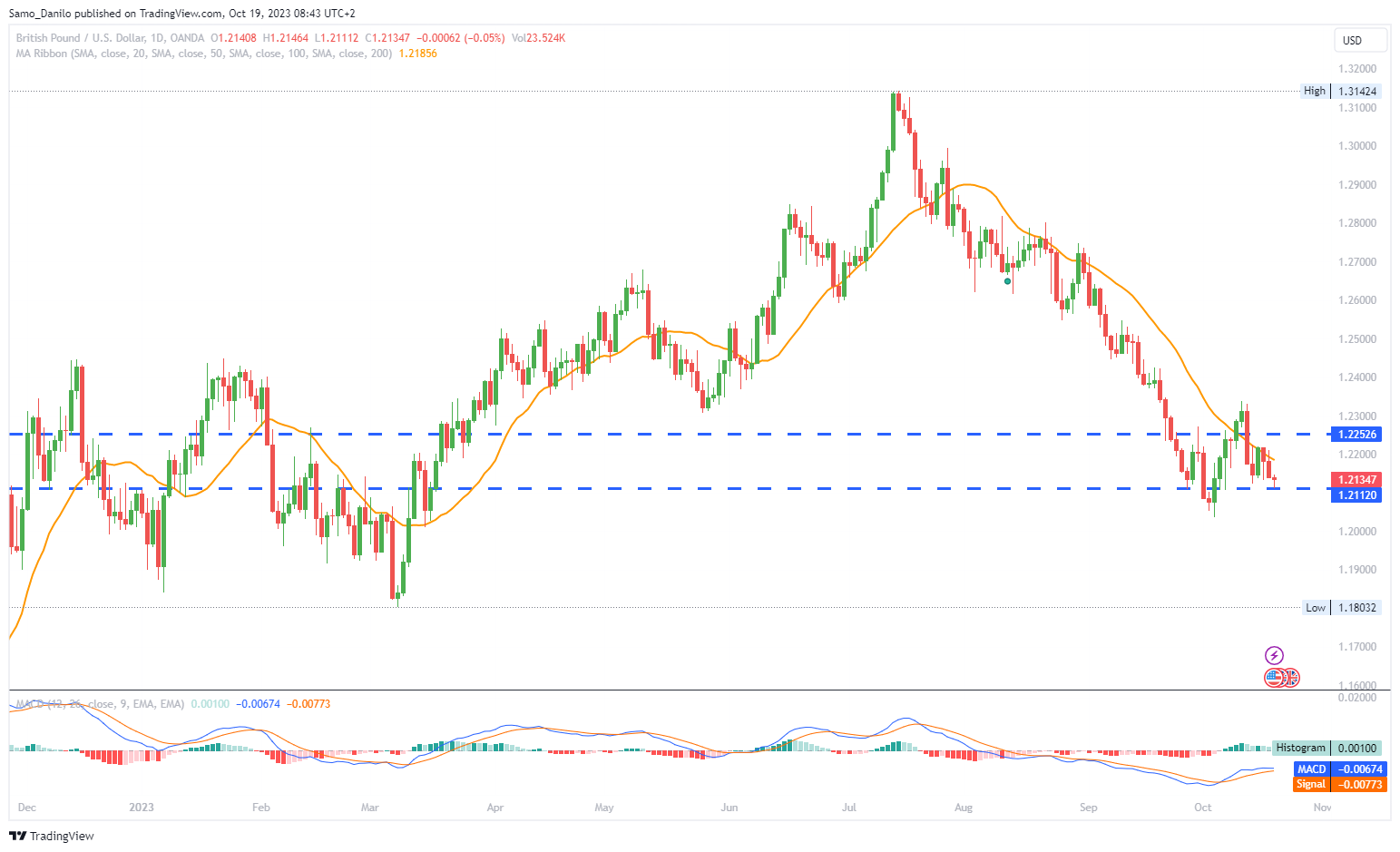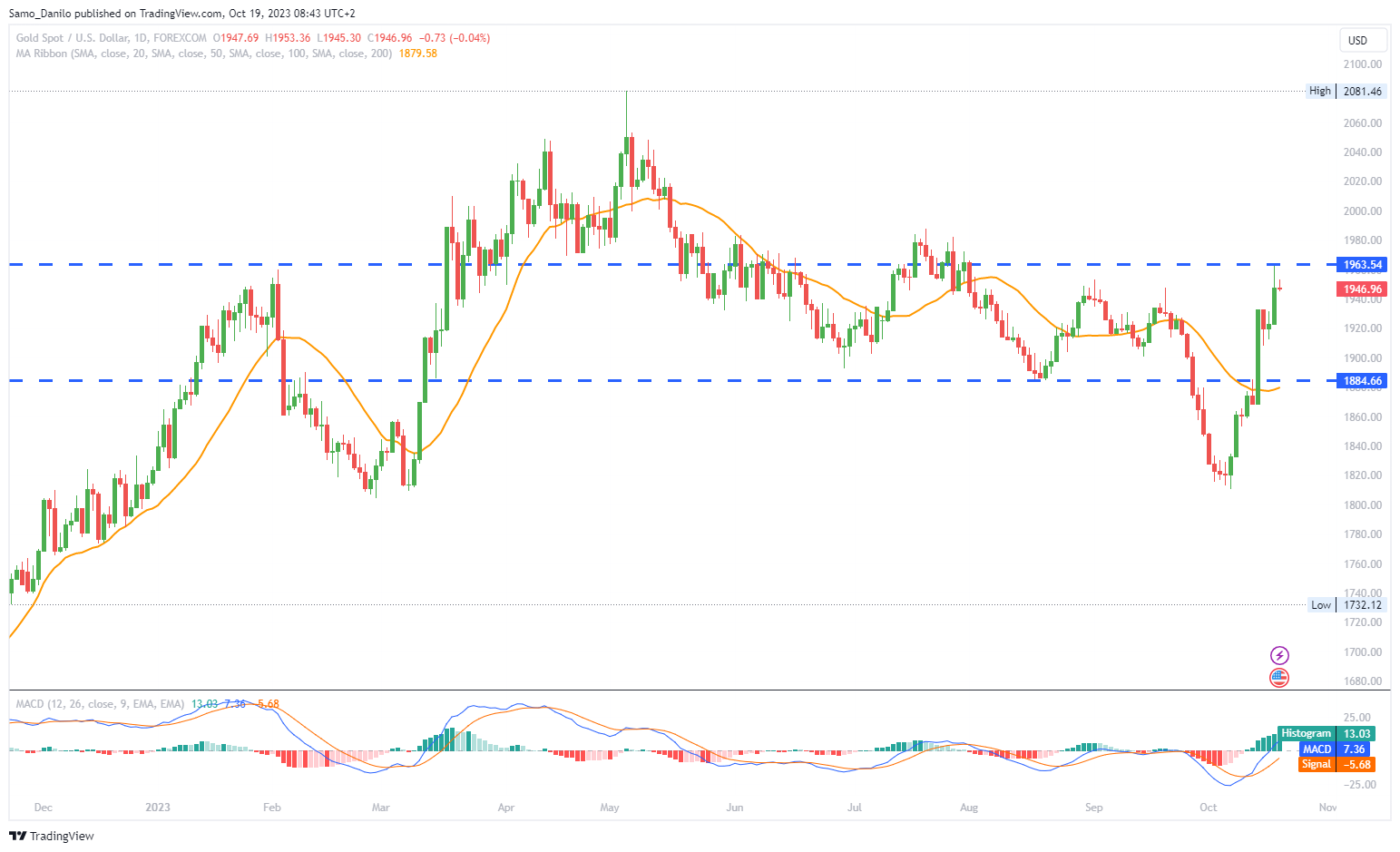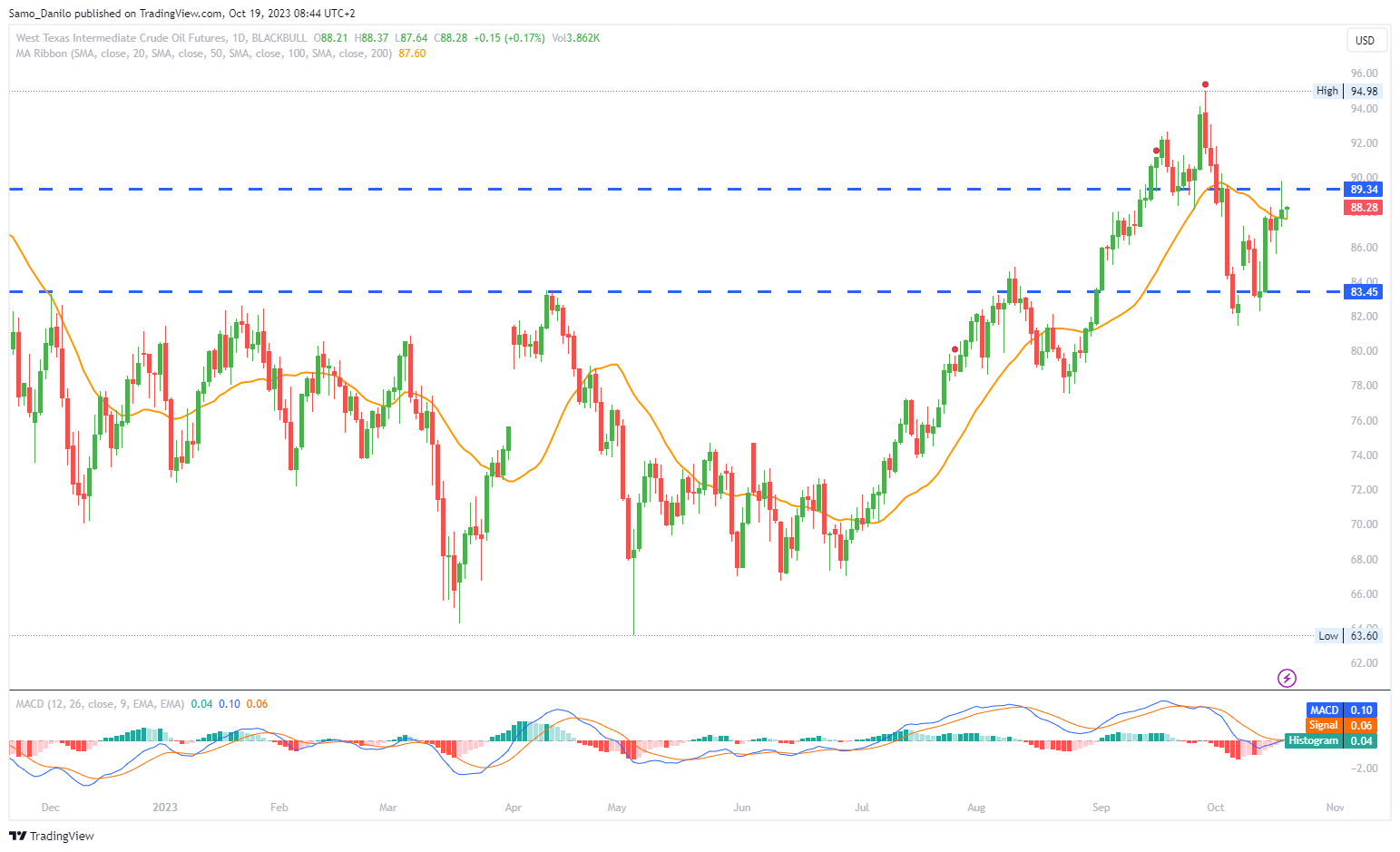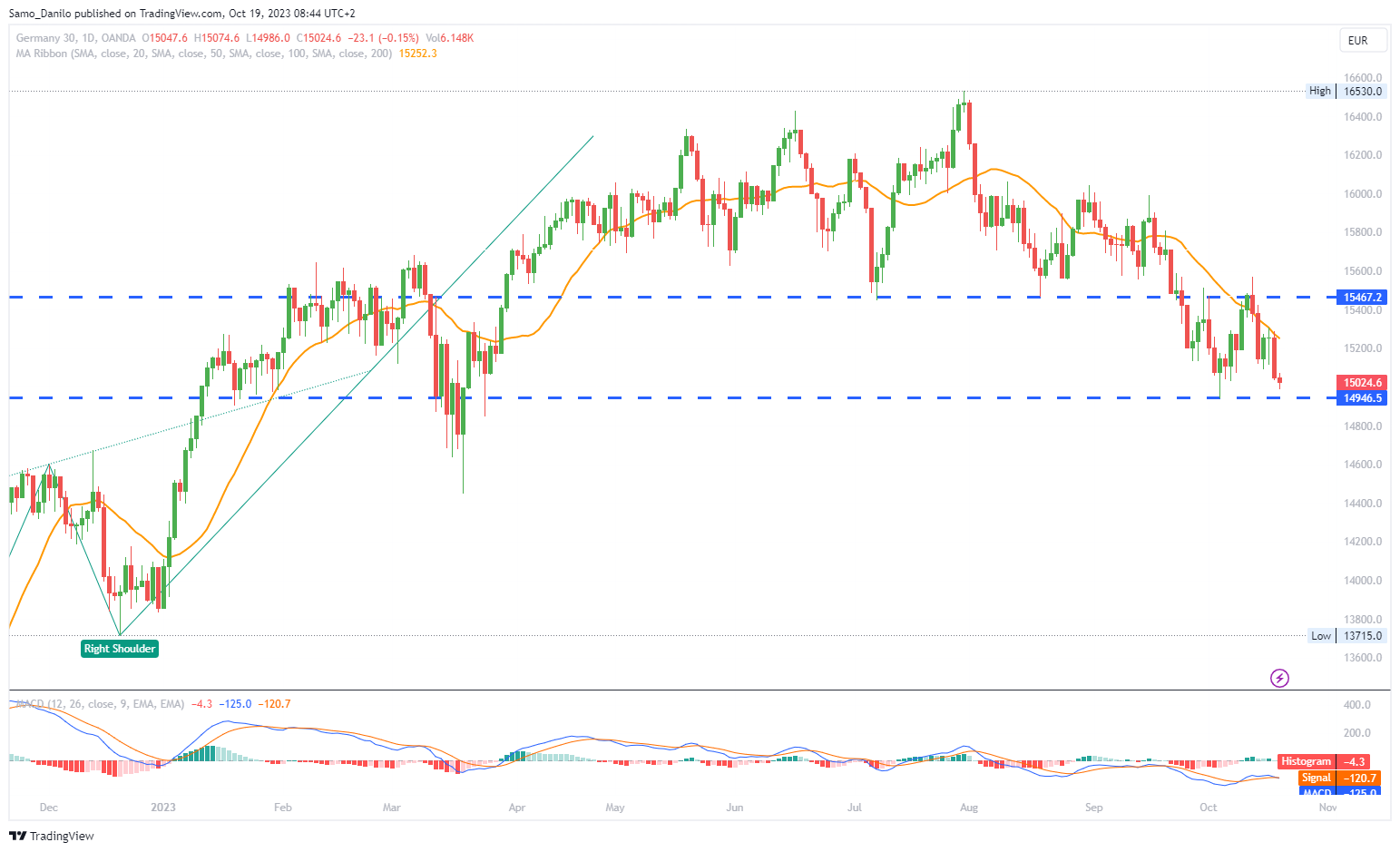EURUSD
- The EUR/USD pair faced difficulty in gaining significant traction on Thursday, trading within a narrow range below the mid-1.0500s during the Asian session. This suggests a struggle to establish a clear direction.
- On Wednesday, the pair fell below the 20-day Simple Moving Average (SMA) after encountering resistance around the 1.0600 level. This indicates a bearish sentiment.
- There are speculations that further rate hikes by the European Central Bank (ECB) may not be on the table, which contributes to a negative outlook for the EUR/USD pair.
- Lingering geopolitical tensions in the Middle East are supporting the safe-haven appeal of the US Dollar, which could impact EUR/USD.
- Thursday will see the release of US Jobless Claims data and the Philly Fed index. Furthermore, Federal Reserve (Fed) Chair Powell is scheduled to speak at the Economics Club of New York, which could offer further insights into the pair's movement.
Closing statement:In summary, EUR/USD struggled to make significant moves, faced resistance around the 20-day SMA, and negative sentiments regarding ECB rate hikes persist. Geopolitical tensions are keeping the US Dollar supported, and upcoming data releases and Powell's speech may influence the pair's direction.
GBPUSD
- The GBP/USD pair is experiencing difficulty gaining significant traction on Thursday, with its movement confined to a narrow range below the mid-1.2100s during the Asian session. This suggests a lack of a clear trend.
- British Finance Minister Jeremy Hunt assessed the recent inflation report, stating that "as we have seen across other G7 countries, inflation rarely falls in a straight line, but if we stick to our plan then we still expect it to keep falling this year," as reported by Reuters. This perspective provides context to the inflation scenario.
- While the latest Consumer Price Index (CPI) numbers might not be strong enough to lead to immediate pricing of a Bank of England (BoE) rate hike in November, there's a possibility that investors may reconsider whether the BoE has completed its tightening cycle. This assessment could help the Pound Sterling remain resilient against other currencies in the near term.
- The situation is compounded by mixed comments from BoE officials. Chief economist Huw Pill mentioned last week that the question of further rate hikes was finely balanced.
- Additionally, BoE policymaker Swati Dhingra cautioned that overtightening could harm the UK's supply potential, while Catherine Mann advocated for an aggressive monetary policy to combat inflation.
| SMA (20) | Falling |
|
|
| RSI (14) | Slightly Rising |
| |
| MACD (12, 26, 9) | Neutral |
Closing statement: GBP/USD struggles for clear direction, the outlook for inflation remains non-linear, and the stance on BoE rate hikes is uncertain, with differing opinions among BoE officials. This creates a mix of factors influencing the Pound's performance against the US Dollar.
GOLD
- The price of gold experienced a significant surge on Wednesday, reaching its highest level since early August, notably around the $1,962-1,963 range. This movement is largely attributed to the increased risk of an escalation in the Middle East conflict.
- Gold's price was notably supported by escalating tensions in the Middle East, especially given recent developments that have the potential to further exacerbate the conflict. This geopolitical situation is contributing to safe-haven demand for gold.
- The broader risk-aversion sentiment, fueled by simmering geopolitical tensions and surging oil prices, has also underpinned safe-haven demand for gold. This trend is not only reflected in the gold market but is also influencing the US Dollar.
- New York Fed President John Williams emphasized on Wednesday that interest rates will need to remain high for a considerable period to bring inflation back to the central bank's 2% target. This stance from a Fed official offers insights into the central bank's monetary policy outlook.
- Other Fed officials, including Fed Governor Christopher Waller and Fed Governor Michelle W. Bowman, expressed differing views on inflation. Waller indicated a preference for the central bank to wait on further interest rate hikes while evaluating the direction of the US economy and inflation. Bowman concurred that inflation has receded somewhat but remains relatively high.
| SMA (20) | Slightly Falling |
|
|
| RSI (14) | Slightly Rising |
|
|
| MACD (12, 26, 9) | Rising |
|
|
Closing statement:In summary, gold prices surged significantly due to increased Middle East tensions, with rising geopolitical concerns fueling demand for safe-haven assets like gold. These factors, combined with various statements from Federal Reserve officials regarding the direction of interest rates and inflation, are currently influencing the gold market.
CRUDE OIL
- The Western Texas Intermediate (WTI) oil price saw a decline after two consecutive days of gains, trading lower around $87.10 per barrel during the Asian session on Thursday. This indicates a short-term shift in market sentiment.
- The United States is reportedly considering exemptions to sanctions on Venezuelan oil exports. If implemented, this could lead to a significant surge in crude production in Venezuela. However, rather than heading to its current primary destination, China, the increased production might be redirected elsewhere.
- The American Petroleum Institute (API) released its weekly report on crude oil stocks, covering the week ending on October 13. The report showed a decline of 4.383 million barrels, marking a notable reversal from the previous stock level of 12.94 million barrels.
- OPEC (Organization of the Petroleum Exporting Countries) has not shown any indications of support for Iran's proposal for an oil embargo on Israel. This stance suggests that OPEC is not currently considering such a measure.
- The US Dollar Index (DXY) is experiencing a resurgence after recent losses. This rebound could be influenced by economic data from the United States and the escalating situation in the Israel-Hamas military conflict. The movement of the dollar is an important factor affecting oil prices.
| SMA (20) | Falling |
|
|
| RSI (14) | Slightly Rising |
| |
| MACD (12, 26, 9) | Slightly Rising |
|
|
Closing statement:the WTI oil price experienced a decline, potentially influenced by factors like considerations of sanctions exemptions for Venezuelan oil, the API's weekly crude oil stock report, OPEC's response to Iran's proposal, and movements in the US Dollar Index. These elements collectively contribute to the dynamics of the crude oil market.
DAX
- On Wednesday, the DAX, the German stock market index, saw a decline of 1.03%. This followed a slight gain of 0.09% from the previous day, resulting in the DAX closing at 15,095.
- The day started with positive momentum driven by better-than-expected economic indicators from China. These indicators initially provided a sense of relief for the market.
- Eurozone inflation figures for September presented a different picture. These figures indicated inflation trends in line with expectations, suggesting that the European Central Bank (ECB) might continue with a more hawkish interest rate path. A hawkish stance from the ECB can have broader implications for the euro area's macroeconomic environment.
- Outside of the economic calendar, factors like corporate earnings and news updates from the Middle East played roles in shaping investor sentiment.
- The Middle East conflict remains the central near-term driver for the DAX. However, alongside this geopolitical concern, central bank policy intentions and the economic backdrop of the euro area are also significant considerations. Factors like stubborn inflation and expectations of a more hawkish monetary policy path can influence the DAX's performance in the short term.
| SMA (20) | Falling |
|
|
| RSI (14) | Falling |
|
|
| MACD (12, 26, 9) | Slightly Falling |
|
Closing statement: In summary, the DAX experienced a decline on Wednesday, primarily influenced by Chinese economic indicators, Eurozone inflation data, and concerns related to the Middle East conflict. Investor sentiment is being shaped by these factors, along with corporate earnings and central bank policy expectations.
